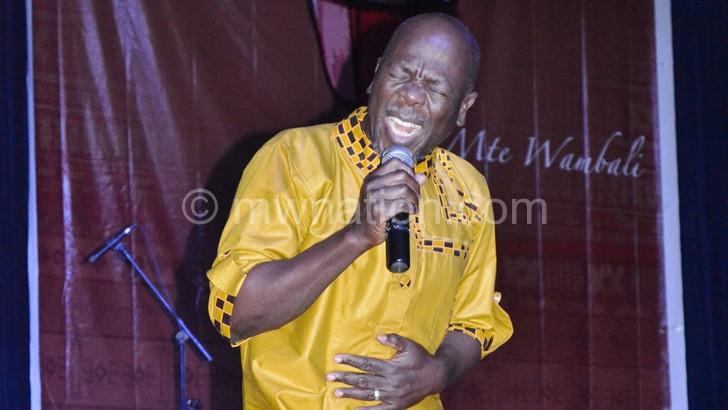Mte wajipereka
When Billy Kaunda sung: “Akuti kumanda kwadzadza, tigona mothinana, kuno kulibe malo. Simungayime kaye” little did he know that over a decade later, those words would still ricochet with many.
The Covid-19 pandemic has and continues to ravage mankind more and graveyards are filling up.

The sad reality is that the global health crisis is raging on claiming productive citizens, leaving behind orphans, widows, widowers and millions of families torn apart.
In Lilongwe, Area 18 graveyard is the final resting place for many of those who have succumbed to Covid-19. One of them is jazz maestro, Mtebeti Wambali Mkandawire who died on Sunday.
Down in the cemetery, mourners are greeted with the sight of freshly filled graves with those in January alone, totaling around 100. For some, the plaques on the tombs are familiar as they represent friends, family and lovers.
At 69, Wambali is a legend both in and outside Malawi after releasing timeless music that earned him numerous awards and recognition.
The awards and nominations include the Bingu Presidential Award in 2011, South African Music Awards (Sama) winner, Kora Award nomination for best Southern African Artist in 2003, World Intellectual Property Organisation Awards for Creativity in 2002, Sama Music Award for Best African Artiste in 2003, Mobo Award nomination for Best African Artist in 2007 and Beffta Music Award for Best African Legend in 2015.
His journey in music dates back to when he was only eight years old in the Democratic Republic of Congo where he was born.
With influences from his mother’s Tumbuka hymns and fables plus his grandfather’s gramophone which played contemporary Congolese music, his uncle introduced him to South African Jazz and music in general.
This gave birth to what the sexagenarian showed effortlessly; a musical background rich in diversity.
On Sunday, as the sun was slowly hitting the horizon, so was Mtebeti’s journey as his remains were interred in his final resting place.
Scores of people from all walks of life thronged to the cemetery to see off a man who believed in perfectionism to the core.
This is an attribute that Minister of Arts, Michael Usi highlighted in his eulogy:
“He always wanted to give out the best. No wonder, he always took the time before releasing songs. What he did was music and then we have organised noise on the other hand.
“No wonder, he carried the Malawi flag and represented the country at different global events. That was pure talent at work,” said Usi, who represented government at the burial.
As the casket bought by President Lazarus Chakwera was slowly but surely being lowered down, Wambali’s widow, Wambui shook her head in disbelief.
As she sobbed, her only daughter, Taonga, held on tightly to the mother as tears streamed down her cheeks.
For those that grew up in the 1970s, they knew him with a different name altogether.
“He was called Greenwood until he gave his life to God and changed to Wambali. He performed with the Sounds Pentagon before moving to South Africa and became a member of a grouping, Friends First, before embarking on a solo journey in 1989 when he released his first album. These are some of his exploits,” said the Reverend Chimwemwe Mhango in his tribute on behalf of Musicians Union of Malawi.
Wambali broke onto the international scene with the critically acclaimed Zani Muwone hit. This was after releasing his first album, Tidzamutamanda in 1989.
Through the years, he went on to release nine albums including Zani Muwone in 2002, Moto dropped five years later, Liberty in 2011 and Calabrash Breath in 2015 which was unique as it was a pure jazz collection. The others are Up and Down the Shire (with MaNyasa), Nchemo and Kaunji-unji.
Commenting on the future of late Wambali’s band, one of his local managers Peter Mazunda said MaNyasa band members were handpicked by the late Wambali himself meaning his death may signal the end of the band as well.
One of MaNyasa Band members, Collern Ali said the members were contacted separately by the late Wambali due to their strengths to be part of the project.
As the mourners and bereaved families left the cemetery, they also left behind scores of unfilled graves seemingly waiting to devour the next victim of Covid-19.





